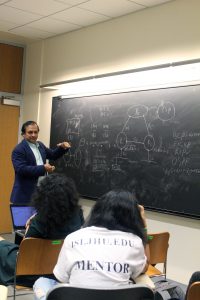New ISI course provides safeguards for smart technologies
It’s hard to imagine a world without smartphones, cellular, Wifi, Bluetooth, or GPS. These are just a few examples of wireless networks that have forever changed society. A 2018 study from ABI Research predicted there will be over 35 billion connected Internet of Things (IoT) devices worldwide by 2023. As a result, internet access will soon be essential for everyone, everywhere. Unfortunately, the wireless networks that keep us connected have increasingly become vulnerable to hackers.
Information Security Institute (ISI) lecturer Ashutosh Dutta’s new fall course, Mobile and Wireless Security, teaches students how to detect and locate vulnerabilities in a network and protect against them.
“Security plays an important role in making sure that user identity or device identity is not compromised and ensure that user-to-user and device-to-device communication is not subjected to man-in-the middle attack,” said Dutta. “This course will provide an overview of various wireless access technologies and mobility protocol taxonomy. It will describe end-to-end security including mobile end point, radio access network, network core, and application services.”
The class introduces both cellular (e.g., 3G, 4G, and 5G) and Wireless LAN (IEEE 802.11 series) technologies, and various types of mobility protocols. Students will examine various security mechanisms to protect the end user, end device, and the communication as the user moves around with wireless access.
“The objective is to impart both theoretical and practical knowledge to the students and make them ready for any future research to solve complex problems. The students learn the fundamentals of mobility and security and their inter-dependency, they will also get a chance to build systems in the lab and conduct various mobility related experiments,” said Dutta.
Different factors in wireless – such as handoff, roaming, heterogeneous access technologies, and broadcast nature of wireless access medium – makes it more vulnerable to hacker attacks. Dutta said that the course provides a comprehensive view of end-to-end security in a mobile network that includes device security, radio access network security, core network security, and application layer security.
Dutta joined the ISI faculty in August and has 30 years of industry and academic experience. He is a Senior Wireless Communications Systems Research Scientist and Lawrence R. Hafstad Sabbatical Fellow at the Johns Hopkins University Applied Physics Laboratory. His research areas include security, mobility, software defined networking, network function virtualization, 4G/5G networks, and IoT.



